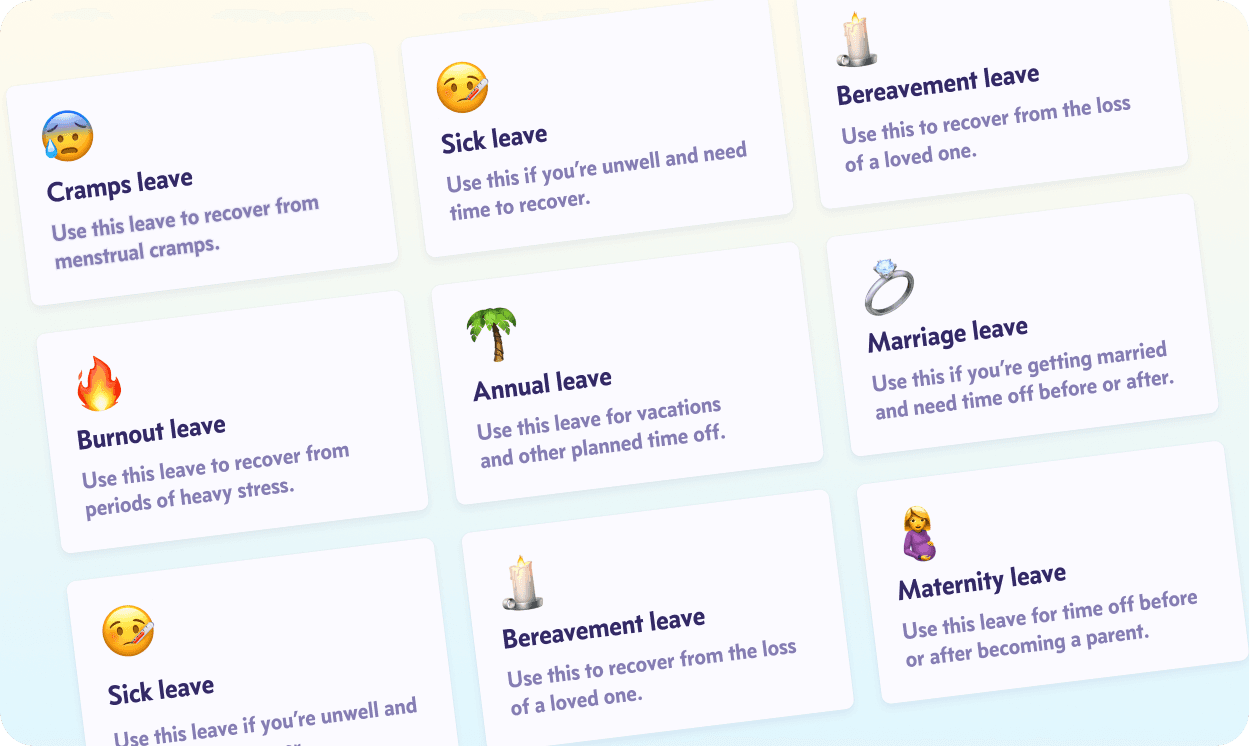Creating a leave policy for your startup: Tips and best practices
Nov 12, 2021

The recipe for the ideal start-up leave policy, like regular recipes, varies depending on who you ask ("A pinch of freedom here, a dash of trust there"). Here are our tips for designing a startup leave policy that's empathetic, transparent, and systematic.
Shape a healthy start-up culture from the get-go
We're infamously powered by hustle culture, and it doesn't help that time off is often associated with empty desks and low productivity. But despite how tempting it is to power through tasks without a day off, taking a leave day works in favour of employees and organisations. It is worth acknowledging, in public, that wanting to be invincible is great, but every superhero needs some time off. A leave policy is only validated by a culture that encourages time off, instead of stopping at tracking vacation time.
If you're struggling with that, it might help to set minimum time off per person, so that everyone feels actively encouraged to take leave. At scale, this practice can help anchor what 'reasonable time off' could looks like for the office.
Ask and answer the right questions
Leave policies are nuanced — they need to be enticing enough for us to come on board and stay, while also being cost-effective to run sustainably. Some great-to-ask questions when designing the ideal leave policy are:
a) Does this policy work towards the desired work culture?
b) Does it influence the workplace’s ability to attract candidates of high calibre?
c) Is this leave policy sustainable for individuals, teams and employees?
d) Are employees entitled to a set number every year, do they accrue them over the months, or do they not have a limit?
e) Are there barriers to remove that could discourage employees from taking well-deserved time off?
Outline the type of leaves you want to include
The world of leave terminologies is a murky quagmire that even the best of us need help getting out of. Leave policies in some countries fall under the generic categories of: sick, casual, unpaid, parental, marriage or bereavement. When defining this, it helps to look at the overarching government regulations and mandates to play things by the book.
But while these are essential, we'd also advocate keeping in mind other leaves that are aimed at being much more inclusive — such as mental health, menstrual, and burnout leave. It’s your choice which ones to introduce, but these form a handy base that you can later fill in the blanks on.
Create flexibility to truly empower your people
"Joe Bloggs doesn't have fixed work hours, I'm sure they don't work enough." This is a popular enough workplace sentiment, which unfortunately defines work done and productivity solely by the number of hours clocked. Over time, you might find colleagues pulling each other down (crab mentality, anyone?) or pressing down too hard on the gas — and that's a recipe for disaster.
Say "no, thank you" to that stigma, just like the studies — many show that flexibility goes a long way in increasing productivity and our overall happiness. These should ideally be supported by well-defined guidelines that create transparency and accountability even outside the workplace.
Build time off into your roadmap and think long-term
In the case of a start-up that's just getting the show on the road, creating a realistic roadmap is a major headache. Almost everything takes longer than it should, the team is still adapting to each other, and it doesn't help that, with limited resources, everyone is critical and can't fill in for each other. (If all this sounds familiar, I feel you, I really do.)
It makes sense to budget — both time and money-wise — for vacation time and unforeseen circumstances. This can also be extended to your team members, to adopt this resource planning process to avoid delays and missed milestones.
The final word
Many first-time start-ups struggle to devote time to defining their workplace culture from the start — such is life, as is business. But as custodians of the future of workplaces as we know them, it's always a great idea to make room for culture from the get-go.



